- Home
- Warwick Deeping
No Hero-This Page 4
No Hero-This Read online
Page 4
I order flowers for Mary, a special dinner and champagne. I expect her by the 3.30 train at Southcliffe station. I go up to the hospital after lunch to clear up some correspondence in order that I may be free. At twenty minutes to three I am called to the colonel’s office. Damn the old man! How much is one at the mercy of the machine. I go in feeling rebellious, to find that Colonel Barter is asking me to dinner.
“To-night, sir?”
“Yes, Brent.”
“It is very kind of you, sir, but my wife is coming for the week-end.”
Barter’s currant-bun eyes twinkle.
“Well, let us make it next Saturday, Brent.”
I thank him, and go out realizing that Barter is by no means senile and inhuman, and that he can refrain from persevering in petty social authority.
I rush off to the station, and this May day feels flowery and bridal. I am ten minutes before time, and the train is five minutes late. I see Mary standing at a window. She seems to be in some sort of uniform, or a dress that suggests a uniform, dark blue and austere and practical. I remember that she is the commandant of a new auxiliary hospital that has been opened at Brackenhurst, but the sentimental man in me is disappointed. I don’t want a uniform, but something feminine and sensuous.
Mary passes me her suitcase. I have arranged for a taxi. I kiss her, and she gives me her cheek, and it has some of the clean chilliness of a cold May morning.
It is absurd, but both of us seem slightly embarrassed.
Is this coming together again an anticlimax after that leave-taking six weeks or so ago, when life seemed so tragic and final?
* * *
Later I discover the woman beneath the uniform. Mary kisses me differently when she has seen the flowers in our bedroom. She is pleased with the White Hart. I tell her there is a special dinner, and she opens her suitcase and shows me an evening frock.
I kiss her again, and want to lead her to the bed. Her face has the secret glow of the woman who understands. She puts a hand over my mouth, and says, “Presently.”
* * *
It is over. I am lying with my head on her shoulder with my heart beating as though I had run a race. She caresses me.
“Lie still a minute.”
I kiss her, and with a strange feeling of deflation, turn on my side.
We begin to talk, and while we are talking I marvel at the illusion of the crude sexual act. It seems to be nothing more than a physiological urge, which, when satisfied, leaves one like an emptied sack. But this woman to whom I am talking is the other Mary, not the pretty lady of a night, but a creature of sensitive understanding, and my dear comrade. She is a spirit inhabiting a body, not mere flesh, and I am conscious of how profoundly she matters to me. I can talk to Mary as I can talk to no one else; she is quick to catch all the subtle shades of meaning, impressions that may be either infantile or sophisticated, prejudices and predilections that it may be difficult to express.
Presently I put her hand to my lips.
“I am sorry I behaved like that.”
She answers, “I would rather you wanted to be like that with me than with any other woman.”
Sunday is fine and warm. I have my work in the morning, but in the afternoon we sit on the beach and watch the sea and the ships. They do not look like things of steel, but softly coloured and diaphanous shapes growing out of the limpid blueness. The peaceful atmosphere is illusive. The sea may hide violence and death, and many of those ships are as Malim puts it “Going Dardanelling.” But we do not want to talk of the war. The beach is warm, and the sky cloudless, and Mary talks to me of home. She has learnt to drive the car, and is helping old Randall with the dispensing and book-keeping. I feel that she is talking to me of dull and simple and homely things because she knows that I am glad to hear of a life that is not in khaki.
* * *
Mary has gone. I am feeling horribly alone and homesick, and I am back at No. 7. I do not mention my week-end with my wife, and the other men seem to understand my reticence. At all events they talk nothing but shop.
Dartnell begins to tell a bawdy story, but it seems to fizzle out and become pointless. Perhaps my silly, sorrowful face did not encourage bawdy humour.
I go to bed, and am even more conscious of my loneliness.
IV
The Spring becomes Summer, and our lives seem to have subsided into pure routine. We bathe; I have even had a game or two of tennis. I am still struggling to penetrate the mysteries of military formalism, but I have not much spare time. I am taking my turn at admissions, as well as functioning in the Company Office.
Macartney tells me that I am approved of by Barter. I am considered to be a conscientious and hard-working officer. Does anyone suspect that I am furiously eager to cultivate this reputation, with the idea of making myself seem somewhat indispensable? Every morning at ten o’clock I report to Colonel Barter, and though I have nothing of importance to tell him, he appears to derive satisfaction from the ritual. There is no more screaming. He treats me with a courtesy and a kindness in which there seems to lurk a little serpent of suspicion.
Macartney tells me that Barter’s one fear is that “someone should sell him a pup.” For a superannuated old gentleman he is drawing very good pay and allowances, and he dreads any scandal that might cause Olympus to thunder. I begin to understand old Barter. Like myself, he wants to stay put. There are other men who are ready to push him off his comfortable perch, and he clings to it like a scolding old parrot. But I like him, perhaps because he approves of me. In one’s innocent beginnings one did not suspect that life in the army would be fiercely competitive and self-protective. One is ready to snarl over one’s particular job and growl, “My bone. Keep off!”
* * *
I can remember speculating in my student days as to what was the ultimate fate of the many casual young men of limited intelligence who contrived to scrape through their examinations, often after much coaching, and who departed to exercise their skill upon a confiding public. It would have filled me with dismay to contemplate trusting anyone I cared for to the rather fumbling hands of these men who were lacking both in character and efficiency.
We appear to be rediscovering some of these botchers and their work here. While acting as admissions officer I am confronted by the most extraordinary cases in the way of diagnosis. I discuss the matter with other members of the staff, and find that their experience has been the same as mine.
There is one M.O. in charge of a battalion who has become notorious for his careless and incredible blunders. The man is either grossly ignorant or bored, perhaps both.
One morning I find a case sent in for admission by him, diagnosed as acute lumbago. The patient is collapsed, pinched, and clay coloured, and to me an obvious and acute abdominal. I bring Dartnell in to check my diagnosis. He is shocked and scornful.
“Lumbago! It’s a perforating duodenal. I’ll swear to it.”
Within an hour or so the man is operated on, and our diagnosis found to be correct. They manage to save him.
Dartnell says to me later in the common-room, “That fellow So-and-So ought to be chucked out into the street.”
* * *
But what right have I to despise any man for being inefficient and without conscience? My own conscience is none too clear. I am doing my best here, but what is the esoteric significance of my striving? Is it the work for the work’s sake, the fine frenzy of professional idealism, or am I hiding behind my work and trying to make of it a protective shell? No, I have no right to cast stones at other men, for my own glasshouse is so very fragile and transparent.
* * *
My house of glass begins to tremble.
Mary has been with me for another week-end, and we have been happy together. On the Monday, after she has gone, I hear the news. Bisgood has passed it to Macartney. Colonel Barter is to be suspended, just why nobody appears to know.
I go in to report and find him shuffling his papers in decrepit agitation. He is lachrymose,
and quite lacking in dignity or reticence.
He says, “They have sacked me, Brent.”
I say that I am sorry, which is true, though my sorrow is largely selfish, and tinged with apprehension. I feel that my fate may be in strange, new, and unfriendly hands.
And I despise myself.
* * *
The new C.O. has arrived, a Field Ambulance colonel who has been invalided from France, and given a home service post. His name is Parker Steel. I go in to report and find myself in the presence of a man not much older than myself. He is very fair, very tall, very thin, with an alert and jejune face and peculiarly pale blue eyes. He is sitting behind the desk, reading a letter; he looks up at me with a kind of cold quickness, and goes on reading. I have saluted and I stand there and wait, observing him, disliking him. Even his small fair moustache, and his long, deliberate fingers are supercilious. I feel myself to be the complete amateur, and rather like a boy dragged before the head master.
He puts down the letter, stares at me, but does not speak. His deliberate and critical poise is disconcerting. I gather that he is waiting upon his dignity for me to explain myself.
“I am the Company Officer, sir.”
His face remains cold and unfriendly. He glances at his wrist-watch.
“In future, you will report to me daily at nine o’clock.”
“Yes, sir.”
“How long have you been here?”
“About four months, sir.”
“Are you one of the home service heroes?”
“No, sir.”
He is staring at the buckle of my Sam Browne belt.
“I wish to inspect the men. You will parade them at ten. I shall also inspect kits and billets.”
“Very good, sir.”
I dislike him more and more, and I have a feeling that the antipathy is mutual.
“That is all for the moment, Mr. Brent.”
I salute and turn to go, and suddenly he calls me back.
“Has anyone ever taught you to salute?”
“No, sir.”
“Things seem to have been rather fortuitous and happy-go-lucky here. You will remind me to arrange for an officers’ parade.”
“Very good, sir.”
“I will inspect the men at ten.”
In the corridor I run into S.-M. Bisgood, but a very different Bisgood. He is in a hurry, and looking hot, angry and flustered. His blue eyes are standing out on stalks, and the complacent crown of the autocrat no longer adorns him. He gives me a peculiar look, hesitates, and with a blink of the eyes passes on. I gather that he too has been receiving shocks.
I am afraid our parades have been much too informal, friendly affairs with a roll-call and a passing inspection of buttons and chins. The good feeling between the men and myself has been such that any criticism I have had to make has taken the shape of a paternal request. I have even had smiles on parade when I have twitted some offender.
It is a blazing August day, and already the tarred road upon which we parade outside the Company Office is feeling the heat. The men are standing at ease. Colonel Steel appears, and I call the men to attention. I turn and salute him, and in return he gives me a casual lift of the hand. His face is as cold as the morning is sultry.
He takes the parade from me.
“Stand at ease! Shun!”
The feet do not come together with a crisp and simultaneous click. There is some lagging and shuffling.
“As you were!”
His voice rasps out stimulating brevities. It is a quiet voice, but it has an edge that cuts. I realize that this parade is to be a ferocious business, and the men’s faces become wooden.
“Is Sergeant-Major Bisgood on parade?”
“No, sir.”
“Why not?”
I explain that Bisgood has been a busy satellite revolving round Colonel Barter.
“Is that so. Send a sergeant for S.-M. Bisgood.”
He proceeds to inspect the men with a merciless and minute thoroughness that is disconcerting. The sergeant who accompanies us is ordered to produce a notebook. Some twenty men need their hair cutting. Belts and buttons are not what they should be, and certain pairs of boots are a disgrace. Sergeant-Major Bisgood joins us, flushed and apologetic, but Steel ignores him. The excoriating of Bisgood is to be reserved for a more private occasion.
I share in it. When the parade has been dismissed, I and Bisgood are ordered to report at eleven o’clock in the Colonel’s office. I can appreciate the fact that Steel is a new broom sent down to sweep away the Barter cobwebs, but the symbol of the broom is not adequate. Steel suggests metal at white heat, or a pale and flaring torch. Bisgood and I stand before his desk. There is no senile screaming. His words sting.
* * *
Later, in the Common Room, I find myself involved in an atmosphere of restlessness and anger. Nearly everybody is feeling a little hot and humiliated. Old Macartney is unusually quiet. Dartnell, with his high colour and quick temper, is not to be repressed.
“Supercilious swine.”
Old Macartney reproves him. Steel is only doing his job, and it may not be an easy one. Besides, he is our commanding officer.
Malim is the only man whose toes have not suffered, but Malim is a cool customer, and inexorably efficient.
“He did not get any change out of me. I suggested that he should squint down my microscope.”
“And did he?”
“Yes.”
“Any results?”
“O, yes, I found out that he hadn’t the faintest notion of what he was looking at.”
* * *
There is a ruthlessness about this man that both frightens and impresses me. It is the first time that I have come into contact with such ruthlessness, and though I can respect it and appreciate its efficiency, I hate the man who exercises it. Sometimes it is difficult to suppress the civilian in myself. I am inwardly shaken with an anger that is tinged with fear. But I suppose these regular soldiers have their problems, and that Steel regards us as a crowd of undisciplined civies who have to be tamed.
The man is indefatigable and tireless. His strenuous pallor is deceptive. He is everywhere, in the wards and the kitchens; he even appears in the operating theatre and watches Smythe explore an abdomen. Smythe is furious about it, and says that he would like to have taken a bloody hand out of the patient’s belly and smacked Steel’s face. I am ordered to produce for inspection all my pay-books and accounts. Steel sits up with me till half-past twelve, exploring and checking figures. He tells me frankly that my handwriting is slovenly, and that I had better detail a clerk to make all the entries in the Impress Ledger. Apparently I have not understood the essential duties of an officer. It is not my business to play about with pothooks, but to supervise, stimulate, control.
I go down to Trafalgar Terrace, tired and discouraged. I feel that my peaceful days are ended, and that this man regards me as a shirker, and that I shall be bundled overseas. But can I complain? Steel is a soldier, and we are at war, and as a realist he is justified in his ruthlessness for the obtaining of results. I suppose he has ideals of his own, and he does not spare himself.
But could it not be done more kindly? Or is it necessary to exercise fear in order to compel men to face death and wounds. We are not free men any longer, and slavery is founded upon fear. If we were conscripts——? But is there any essential difference between the volunteer and the conscript when once they have been fed into the hopper of the war-machine? Why did I surrender my freedom? Through fear. Because I was afraid of being despised by my neighbours, and was conscripted by public prejudice. Thousands of men must have been coerced by a cowardly conscience.
* * *
Bisgood stops me in the corridor with an air of almost servile yet mysterious politeness. He has become servile under the metal of Steel’s tongue, and so, in a sense, have I. Men like Steel manufacture servility. I loathe myself and him for being tempted to propitiate him, as a slave may fawn before the man who holds the whip
of authority.
Bisgood says to me, “Just a word, sir. If I were you I’d apply for leave.”
I thank him for the hint, and realize with an inward shock that my time is running short, and that I shall soon cease to be embusqué. But what do I fear, death or wounds, or is it the dreadful uncertainty, the realization of one’s complete helplessness, the knowledge that one can be pushed hither and thither like a piece on a board? It is the sensitive, individual I that protests and struggles.
I ask Colonel Parker Steel for leave. I feel that I am asking a favour of him, and that if he grants it it will be as a favour. My request hardly seems to command his attention. He is signing returns, and he goes on signing them.
“Take seven days while you can, Mr. Brent.”
“When shall I go, sir?”
“To-morrow. I am expecting you to be warned for overseas service.”
I stand hesitant.
“I suppose you cannot tell me, sir, when I shall be sent?”
He looks at me for a moment with his cold eyes.
“I have not the least idea.”
Nor does he care. But why should he care, why should any man care? This war has stripped us of so many comfortable illusions, the superstition that one’s individual fate seriously matters to more than two or three people. Even in this communal crowd, and in the thick of all the guff about comradeship, one is conscious of a dreadful isolation, and of a loneliness that is Arctic. My people are dead; I have a few uncles and aunts and cousins, but when blood is to be spilt, it may be no more than water.
I suppose there is no one but Mary who will care.
But what an egoist I am!

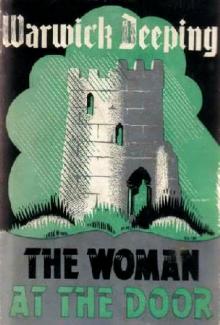 The Woman at The Door
The Woman at The Door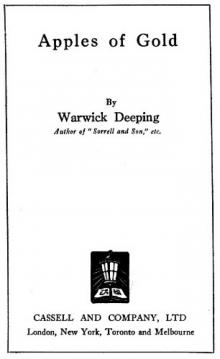 Apples of Gold
Apples of Gold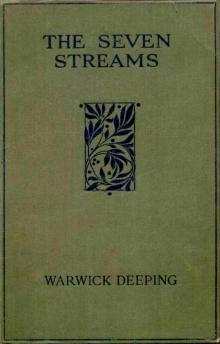 The Seven Streams
The Seven Streams Old Wine and New
Old Wine and New No Hero-This
No Hero-This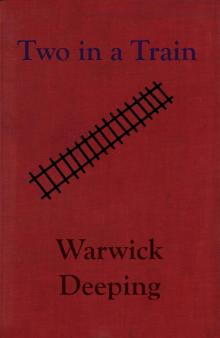 Two in a Train
Two in a Train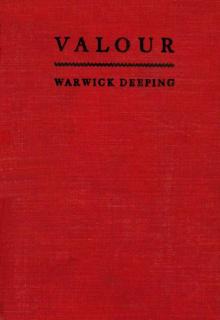 Valour
Valour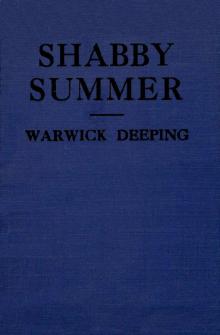 Shabby Summer
Shabby Summer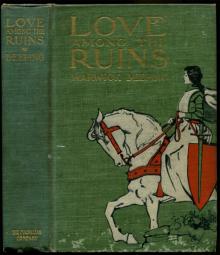 Love Among the Ruins
Love Among the Ruins The Short Stories of Warwick Deeping
The Short Stories of Warwick Deeping